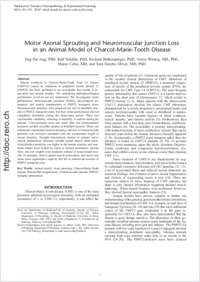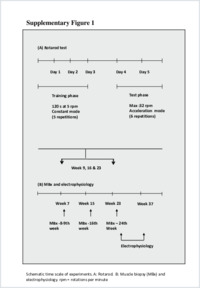Motor axonal sprouting and neuromuscular junction loss in an animal model of Charcot-Marie-Tooth disease
- Ang, Eng-Tat Department of Medicine/Unit of Anatomy, University of Fribourg, Switzerland
- Schafer, Ralf Department of Physiology II, Faculty of Medicine, University of Bonn, Germany
- Baltensperger, Richard Ecole d'ingenieurs et d'architectes de Fribourg, Switzerland
- Wernig, Anton Department of Physiology II, Faculty of Medicine, University of Bonn, Germany
- Celio, Marco R. Department of Medicine/Unit of Anatomy, University of Fribourg, Switzerland
- Sancho Oliver, Sara Department of Medicine/Unit of Anatomy, University of Fribourg, Switzerland
-
2010
Published in:
- Journal of Neuropathology & Experimental Neurology. - 2010, vol. 69, no. 3, p. 281-293
Animal model
Axon sprouting
Charcot-Marie-Tooth disease
Muscle fiber morphometry
Neuromuscular junction
PMP22
Synaptic transmission
English
Muscle weakness in Charcot-Marie-Tooth Type 1A disease (CMT1A) caused by mutations in peripheral myelin protein 22 (PMP22) has been attributed to an axonopathy that results in denervation and muscle atrophy. The underlying pathophysiological mechanisms involved are not understood. We investigated motor performance, neuromuscular junctions (NMJs), physiological parameters, and muscle morphometry of PMP22 transgenic mice. Neuromuscular junctions were progressively lost in hindlimb muscles of PMP22 transgenic mice, but their motor performance did not completely deteriorate during the observation period. There was considerable variability, including in laterality, in deficits among the animals. Cross-sectional areas and mean fiber size measurements indicated variable myofiber atrophy in hindlimb muscles. There was substantial concomitant axonal sprouting, and loss of neuromuscular junctions was inversely correlated with the accumulated length of axonal branches. Synaptic transmission studied in isolated nerve/muscle preparations indicated variable partial muscle denervation. Acetylcholine sensitivity was higher in the mutant muscles, and maximum tetanic force evoked by direct or indirect stimulation, specific force, and wet weights were markedly reduced in some mutant muscles. In summary, there is partial muscle denervation, and axons may retain some regenerative capacity but fail to reinnervate muscles in PMP22 transgenic mice.
- Faculty
- Faculté des sciences et de médecine
- Department
- Département de Médecine
- Language
-
- English
- Classification
- Biological sciences
- License
-
License undefined
- Identifiers
-
- RERO DOC 20430
- DOI 10.1097/NEN.0b013e3181d1e60f
- Persistent URL
- https://folia.unifr.ch/unifr/documents/301840
Other files
Statistics
Document views: 107
File downloads:
- pdf: 169
- Supplementary figure 1: 105

